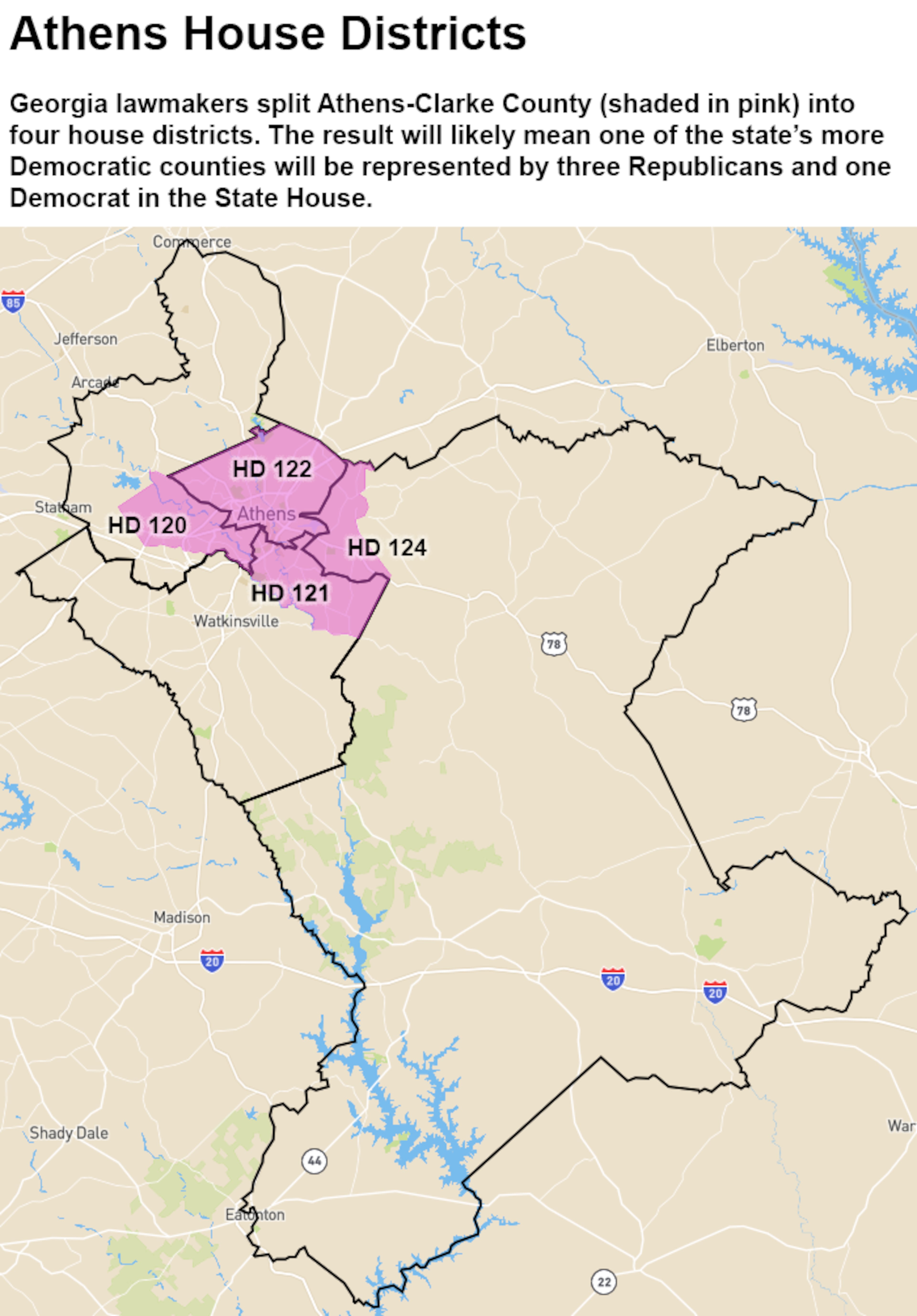Athens voters wanted more unified maps. Instead, they’re more divided

Going into redistricting, Athens was the poster child for a heavily Democratic city split into several districts to maximize Republican representation.
Athens voters told legislators in public meetings they wanted their community to be unified, with representation that more closely matched their political leanings.
They didn’t get what they asked for.
Athens will be even more divided than before in the Georgia General Assembly, with four representatives and two senators in the city of 129,000 people. Before redistricting, Athens had three representatives and two senators.
The breakup of a liberal college town into Republicans pieces attached to rural areas shows how redistricting results in mismatched representation. The Republican majority in the Georgia General Assembly drew maps that give Athens five Republican state legislators, a GOP congressman and one Democratic state representative.

Kathy Lynne Sanderson, an Athens resident who had asked legislators to unify the community during a hearing in July, said they didn’t listen to voters’ requests.
“I don’t really feel like I have a representative,” Sanderson said. “Athens-Clarke County definitely leans Democratic. It’s progressive, and I don’t see that reflected in any of our representatives’ votes and statements.”
Athens, which supported Democrat Joe Biden with 70% of the vote last year, could elect more Democratic candidates if it weren’t parceled into so many districts.
District borders slice the city into quarters. Its four lopsided House districts extend into neighboring rural and Republican counties, where there are enough voters to outnumber the city’s liberal core.
Dividing cities is a common tactic in redistricting across the United States, with the majority party drawing lines through communities to reduce their voting strength.
This kind of partisan influence over mapmaking is how a state like Georgia, with close margins between Republicans and Democrats, ends up with a General Assembly that tilts 58% toward the GOP.
With about 60,000 people per state House district and 191,000 people per state Senate district, Athens could have mostly fit in two House districts and entirely within one Senate district, according to census numbers.
Republicans say they’re not always represented either.
Gordon Rhoden, chairman of the Athens-Clarke County Republican Party, said his party doesn’t have a voice in local government.
“The mayor and commissioners of this town are purely Democratic. Some of them are card-carrying Democrat Socialist Party,” Rhoden said. “If the lines were drawn the other way — and they have been in the past — they would say they are totally fine with that.”
Legislators wrote in their redistricting guidelines that they would consider community boundaries, but they didn’t always do so.
About 62% of cities with populations over 10,000 were split into more than the minimum number of House districts required, according to Ken Lawler, chairman of Fair Districts GA, a redistricting advocacy organization. About 44% of cities were similarly divided in new state Senate districts.
“Cities are a decent proxy for those communities that have defined themselves. When you have to deal with multiple state representatives or senators, it’s harder to get your voice heard,” Lawler said.
Besides Athens, other split cities after this year’s redistricting include Augusta, Columbus, Duluth, Statesboro and Waycross.
But legislators consolidated several cities into more compact House districts, such as Lawrenceville, Marietta, McDonough, Stockbridge and Stonecrest,
The maps also split 69 of Georgia’s 159 counties in the state House, down from the current 73 divided counties.
On the federal level, legislators unified Athens under one congressional district after it was separated in two under the previous maps. Population changes shifted the borders between the two Republican-held districts to the north, leaving Athens entirely within an area represented by U.S. Rep. Jody Hice.
Republican U.S. Rep. Andrew Clyde objected to the new borders, which also put his Jackson County home in Hice’s 10th District. Members of Congress aren’t required to live in their districts, and Clyde announced he would still run to represent his current 9th District.
“I am disappointed in the redistricting process which has forced me to choose between the district I love and my home community that I love,” Clyde wrote on Facebook. “If Georgia’s leaders are punishing elected officials for being too conservative, then it’s time for things to change in Atlanta.”
Athens’ only Democrat in the General Assembly, state Rep. Spencer Frye, is confined in a district covering the northern part of the unified city and county. The county’s three other Republican districts cross into neighboring counties. A more compact map would fit almost all of Athens in two districts, with a few residents in a third district.
“Athens has enough Democratic voters and population to be divided into two state House districts and fill one state Senate district, but instead our community voice has been diluted by partisan politics,” Frye said.
The three Republican House members whose districts include parts of the Athens area didn’t return messages seeking comment: state Reps. Houston Gaines of Athens, Trey Rhodes of Greensboro and Marcus Wiedower of Watkinsville.


